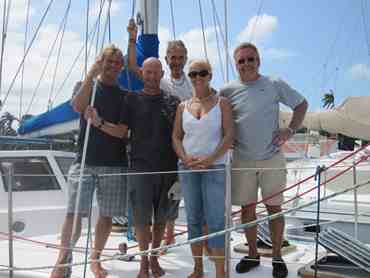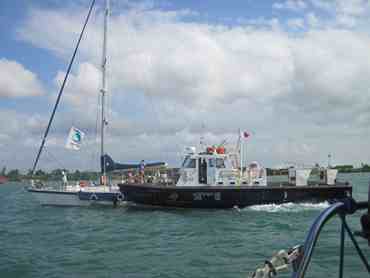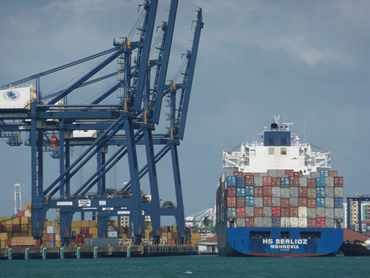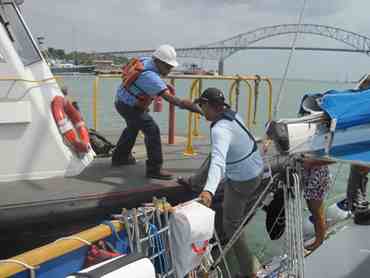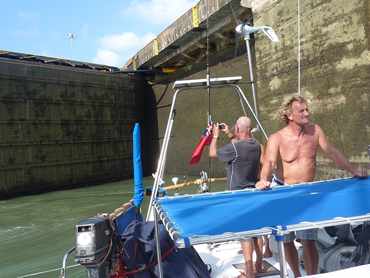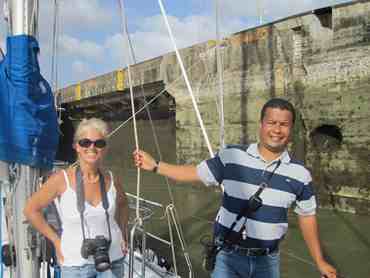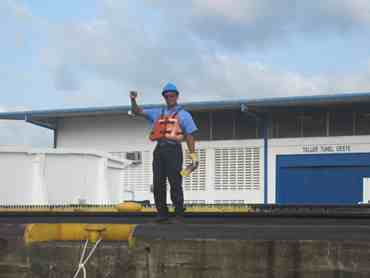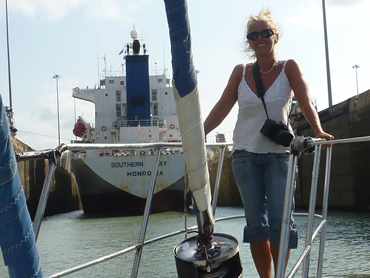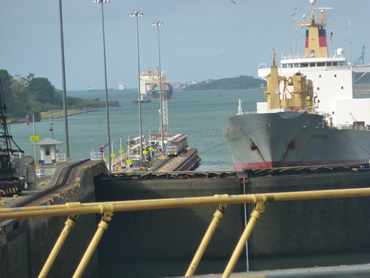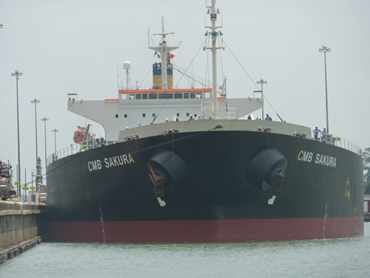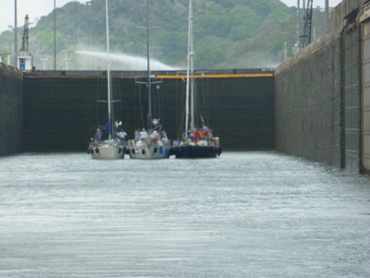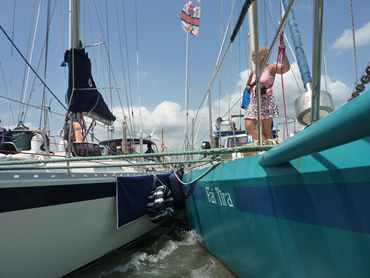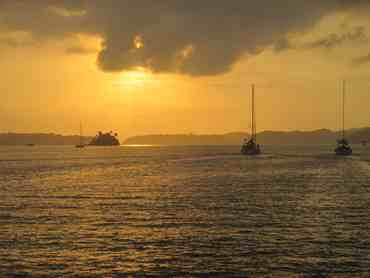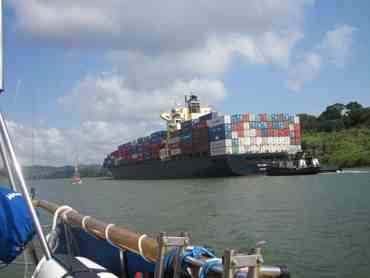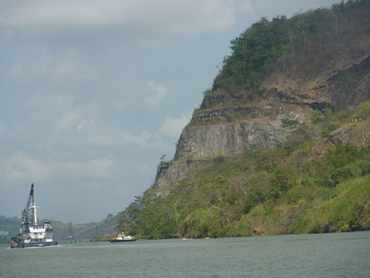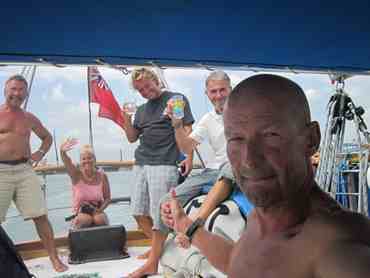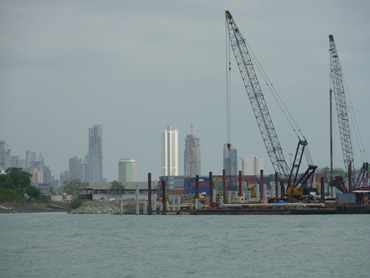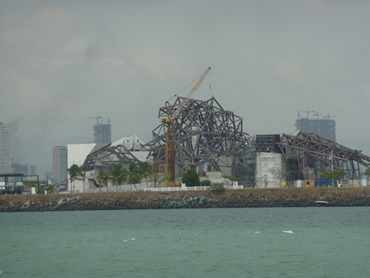Fai Tira Panama City 08:54.47N 79:31.60W Wednesday 10th February

|
Fai Tira
Blog Wednesday 10th February Fai Tira
Panama City 08:54.47N 79:31.60W So,
the daunting but pleasurable task of describing our passage through the Panama
Canal falls to me. Where to
start, how to convey immense sense of scale, the experience, apprehension,
anticipation and, above all, feeling of childlike excitement, Well the beginning
always seems to have a habit of being the best starting point, so that’s
where I’ll go. Our journey commenced at 1.30pm on Monday. This was all to
be under power and, at times, doing speeds that would test our engines’
fortitude. We left the Shelter Bay Marina with the biggest crew that’s
been on board since we’ve owned the boat. Carol from Bali Blue, Paul from
Jackamy, J from Chisel (also known as Chsalonina) and, of course, Pete and
myself. All this was in order to comply with the canal regulations that each
yacht contained four line handlers to manage the 125 foot long warps that would
position us centrally in each lock. Before long
our boat was joined by those of Enchantress and Mercury Rising, both were to be
our sailing companions during the transit. Not far away was Peregrina, another
of the BWR boats. We headed out, into one of the busiest shipping lanes in the
world, and on to the holding area known as the Flats, to rendezvous with pilots
boats, where we were each to pick up our individual Panama pilots, who would
oversee our daily journey.
The Canal
Crew and heading to pick up our Canal Advisors. Left to right Paul, Pete,
John, Carol and J. Straight
away this felt special. We were leaving the Atlantic that had been our home for
the last 6 months. We would pass through one of the greatest feats of civil
engineering ever. At the Atlantic end, our boat would be lifted 85
feet in 3 stages. Travel 31 miles and then drop 85 feet in a further 3 stages.
We would rub shoulders with countless pages of history and cross beautiful
lakes flanked with lush rain forests before shooting the Bridge of Americas to
enter the vast area of water known as The Pacific Ocean...........How could we
not be excited???? This felt
just like what it was. One of the great shipping centres of the world and here
we were in our small convoy, part of it......... What exotic theatre!!!
The First
Lock The
atmosphere of anticipation was palpable. We were like the proverbial dog with
two tails (least I think it’s tails??) Everything
looked larger than life. We were surrounded by a whole range of massive ships,
sometimes towering above us. The shore was lined with huge storage areas and
buildings together with lines of tall, statuesque cranes all looking as though
they were standing on sentry duty.
Cranes Our early
arrival, at the flats, had us milling around for a period. We then decided to
anchor and wait. It wasn’t long before the pilot boat arrived. Our pilots
then had to make the leap across boats to join us. We had been warned of the,
sometimes, cavalier approaches as the pilot boat skippers came in bow first as
though they were making an attempt at T boning. In the event they were great,
gently pulling alongside and making a smooth and effortless transfer in spite
of the intimidating size of their vessels.
The name of
our guy, who would see us through the first three locks and into Gatun Lake,
was Dalton Rodriguez a young and affable family man. He was in possession of a
degree, had a fantastic wealth of knowledge and sense of pride about the canal,
was really communicative, and had a brilliant command of English.
Our first
challenge was to provide him with an acceptable lunch time snack and cold non
alcoholic drink (where were we supposed to find that on our boat??) A rummage in
the fridge revealed a cold coke and another, in one of the bilges, produced a
tin of ham. A three day old baguette came miraculously to hand, so we were in
business. He thought it was great and we were off to a flying start. We all set
off, individually, towards the first lock.
With the
expectation mounting as it came into view, we slowed and positioned ourselves
into the formation for rafting. Mercury Rising, with its bow thrusters and
rubber tyre fenders, would be the central boat. We would be secured, in a
staggered position to prevent spreaders tangling, to her port beam, with
Enchantress similarly secured to starboard. Then as one complete unit, we lined
up astern of the cargo ship, Southern Bay Monrovia and followed her into the
lock entrance, with us in turn being followed by another raft containing the
other BWR boat Peregrina. As we
entered men, on the walls above, threw heaving lines complete with monkey
fists. These tightly bound knots acted like missiles, guiding the lines to
their destination. This can be a risky procedure as David on Enchantress found
out, when one crashed against his spray hood window smashing the glass into
splinters. The line
handlers first job was to secure the lines to the bowline prepared warps. As the boats
moved forward the men above went ahead, climbing as the height of the wall
increased until they were way above our heads, before pulling in the warps and
tying us off to a bollard in the sky.
We were now
encased by a wall of massive concrete blocks and the huge steel gates closed
slowly behind us, now making our chamber complete.........What an eerie
sensation! The water
used to flood the locks is provided from the man-made Gatun lake and is gravity
fed via a system of culverts each large enough to accommodate a locomotive. It
then enters several lateral culverts running under the lock chamber, each of
these has five, four and a half foot diameter holes. The water is then
distributed through 100 holes in the chamber floor. 52
million gallons of fresh water are used during the passage of one ship between
oceans, its task complete the water then flows, uninterrupted, into the ocean. This was what
we’d all been waiting for. Dalton was directing operations, brilliantly,
on our boat. I was on the bow and responding as fast as I could to his
instructions to keep the line taught while, at the same time, waiting for the
infamous surge..............! It never actually came. The levels rose rapidly,
my activity increased and before long we were there, with me feeling more than
just a bit puffed and looking back in amazement at the level we’d just
come from.
Two locks
later and now early evening, we entered Gatun lake and headed for the big
mooring buoy that was to be our overnight stop. At this point the raft had to
split in order to distribute the load more evenly round the buoy, a manoeuvre
that involved an action man, macho type leap on to its’ surface by Tim
off Mercury Rising, before tying up. Once secured, it was goodbye and a
big thanks to Dalton.
All rafted
up. A well
earned celebratory beer, food prepared by Carol and myself and then it was
party time. They started on individual boats merging as we became more
lubricated and went on through the night ( and I do mean through the night)
with the guys from, the now newly named Mercury Riesling, falling asleep
briefly where they sat before the rude awakening at the arrival of the new
pilots, at 6am, for the next stage of the journey Our new
pilot was called Amado Castillo, another guy with impeccable credentials and
personality to match. We now had a time constraint for the completion of the 31
miles of Gatun Lake and set off, us leading, the engine almost flat out, making
six knots plus and with some very second hand crew members on board.
Gatun Lake
early morning with Amado Castillo Our pace was
good and we made the entry to the lock at Pedro Miguel in quick time for the
first stage of our decent. Once through we entered Miraflores Lake and
travelled the mile to the two stage lock at Miraflores, where we made our final
decent. It was witnessed via the web cam by Pete’s wife Judy and many of
our friends in Dartmouth and bought us down to the level of the Pacific.
Big Ships
and the Centenary Bridge. We were on
our final run in and on a high, reflected by the continuous banter coming
across the VHF We passed
the many massive engineering projects, sometimes removing whole islands, as
they seem to continually modify the approaches and incorporate new lock systems
in order to accommodate the ever increasing size of vessels. Then before long
our goal and the subject of many conversations came into sight, The Bridge of
The Americas. I’ve seen more exciting looking structures, but never any
with more significance. Then out came the gin and tonics as we passed under.
The Bridge
of The Americas With the
amazingly spectacular skyline of Panama City acting as the backdrop the picture
was complete. Welcome to
the Pacific.....................!!
For an
opportunity to read more about the canal and its’ history go to the link Bye for now, Pete and John. |
